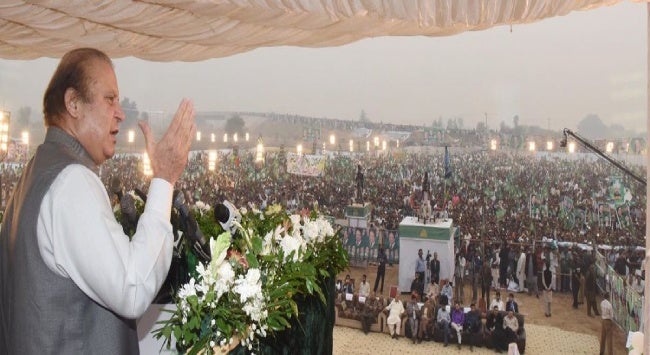Pakistan’s February 2024 Elections:
A Sense of Uncertainty Prevails
Imran Ahmed, Muhammad Saad Ul Haque
6 February 2024Summary
The elections in Pakistan on 8 February 2024 carry significant implications for the nation’s political and economic future. Former Prime Minister Nawaz Sharif, returning from exile, is predicted to become the next prime minister, despite a historically tumultuous relationship with the army. Since Imran Khan’s 2022 ouster, Sharif has faced legal challenges, electoral hurdles and a media blackout. Despite political campaigns, a sense of uncertainty prevails among Pakistanis leading up to the polls.
On 23 January 2024, the caretaker federal cabinet approved the army’s deployment on election day to ensure the peaceful conduct of the polls, which will be held on 8 February 2024. Imran Khan was the preferred candidate of the military establishment in the previous election but once his relationship with the army went afoul, the establishment shifted its focus to former prime minister, Nawaz Sharif. Sharif, who recently returned from a self-imposed exile in the United Kingdom, has historically had a tumultuous relationship with the army but he is predicted to become the next prime minister.
Since the previous elections in 2018, Pakistan has faced increasing political turmoil and instability. Khan joined the list of Pakistan’s prime ministers ousted before completing their terms in a 10 April 2022 vote of no-confidence. This action was led by the Pakistan Democratic Movement (PDM), a coalition of 11 political parties such as the Pakistani Muslim League-Nawaz (PML-N), Pakistan Peoples Party (PPP) and Jamiat Ulema-e-Islam-Fazl ur Rehman.
However, since Khan’s ouster and in the buildup to the current elections, the fragile relations within the coalition have fractured. The PPP, the junior partner of the PDM, will be contesting the elections separately, while the PML-N will join forces with Muttahida Qaumi Movement-Pakistan. Most recently, the Chairman of the PPP, Bilawal Bhutto-Zardari stated, “Our fight is not with any other political party, but poverty, price hikes and unemployment”, while warning political leaders to refrain from joining the PML-N as they would lose their “political weightage”.
Casting a shadow over the upcoming events is the uncertainty surrounding the fate of Khan, the leader of Pakistan Tehreek-e-Insaf (PTI). Khan was jailed on 5 August 2023 for three years on a corruption charge and faces more than 180 charges. He was also the victim of an alleged assassination attempt. In addition, Khan has seen his party composition hit with several cases of political dissidence and he had his nomination papers for the upcoming elections rejected. On 30 January 2024, he was sentenced to 10 years in prison for leaking state secrets, following a closed court hearing under the Official Secrets Act in Rawalpindi’s Adiala Jail.
Even as the establishment seeks to censor Khan’s name from mainstream media, his popularity has increased, with an opinion poll in December 2023 showing a 57 per cent approval rating, compared to 52 per cent for Sharif. Moreover, around 90 per cent of PTI’s nomination papers have been rejected and the use of their party symbol has been banned, effectively ending the chances of Khan’s party participating in the elections. These events challenge both the credibility of the elections and the lack of a level playing field.
In addition to the persistent threat of political turmoil, the new government must grapple with Pakistan’s ongoing economic crisis. The previous government was successful in working out a US$3 billion (S$4.03 billion) International Monetary Fund (IMF) programme for nine months, but the country’s economy is still facing an unprecedented rise in inflation to almost 38 per cent. Moreover, while the government was able to avoid going into default, foreign reserves have fallen to around US$3.5 billion (S$4.7 billion) and there is still US$25 billion (S$33.5 billion) worth of debt repayments that will require assistance from foreign lenders.
In September 2023, a hike in electricity costs triggered a nationwide protest that endangered the current IMF programme. The various measures implemented by the government to satisfy the conditions of the IMF programme, such as cutting energy subsidies, caused consumer electricity bills to almost double in July 2023. With Khan’s ouster and the credibility of the upcoming elections in question, many people in Pakistan have had a muted response towards the otherwise loud and boisterous political campaigns of the parties. Muhammad Iqrar, a resident of Rawalpindi, stated, “We used to have buntings, banners, flags, music blaring from the speakers put up by different candidates…It used to be a festival. Now, it’s just so quiet”. His statement echoes the uncertainty that many Pakistanis still feel in the lead-up to the upcoming elections.
. . . . .
Dr Imran Ahmed is a Research Fellow at the Institute of South Asian Studies (ISAS), an autonomous research institute in the National University of Singapore (NUS). He can be contacted at iahmed@nus.edu.sg. Mr Muhammad Saad Ul Haque is a Research Analyst at the same institute. He can be contacted at msaaduh@nus.edu.sg. The authors bear full responsibility for the facts cited and opinions expressed in this paper.
-
 More From :
More From :
-
 Tags :
Tags :
-
 Download PDF
Download PDF



